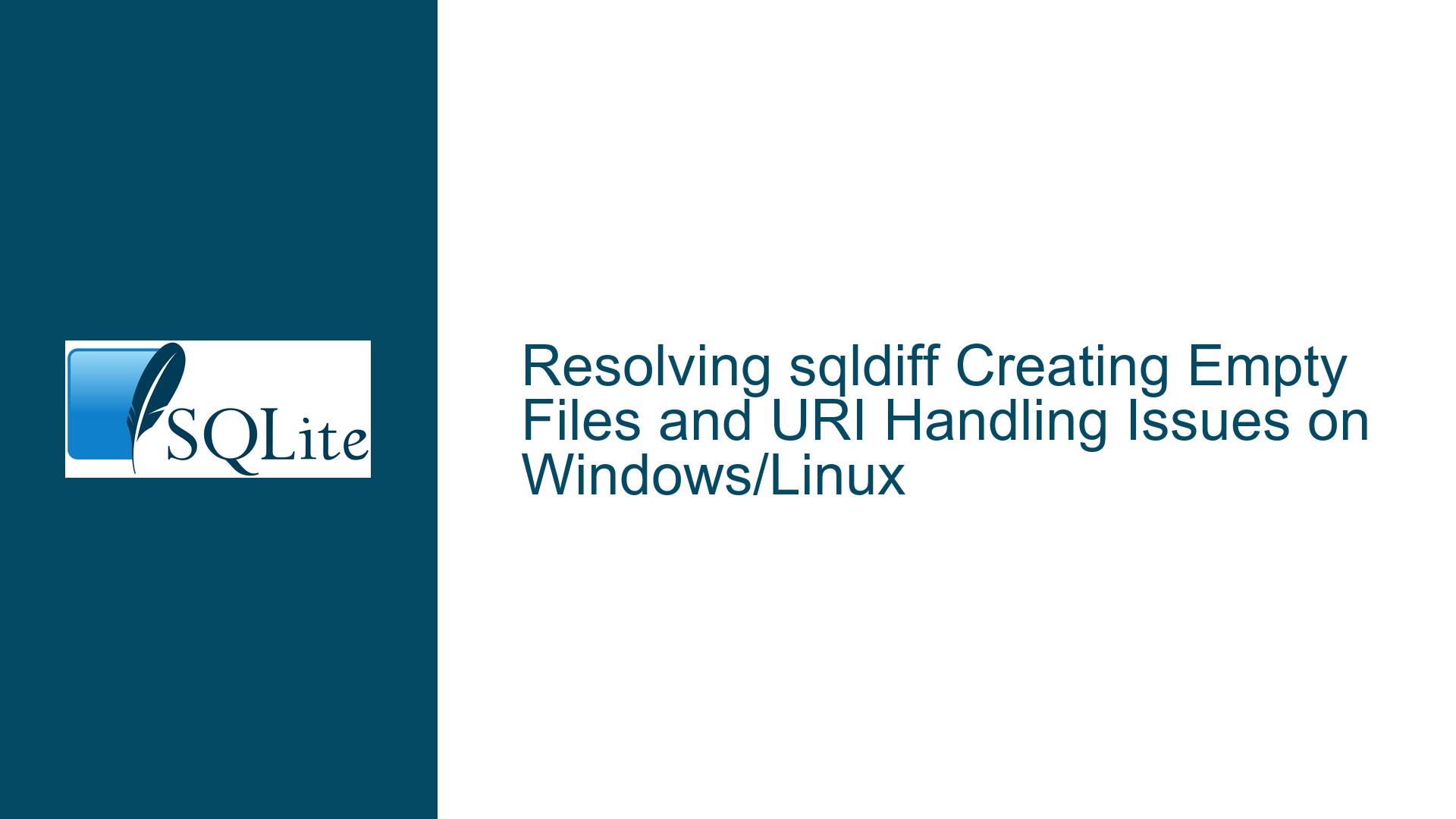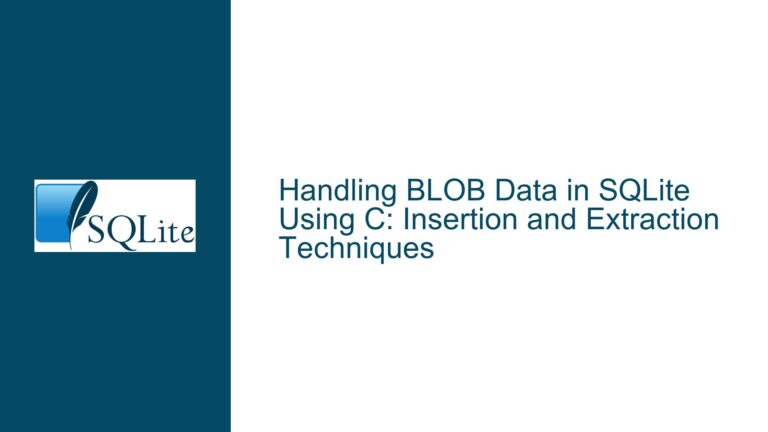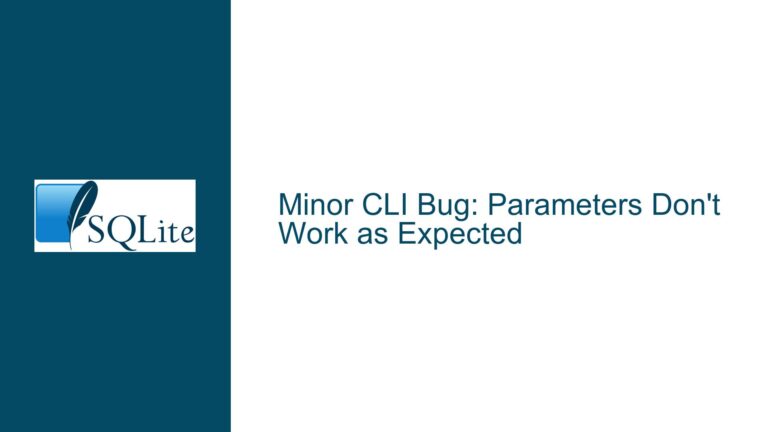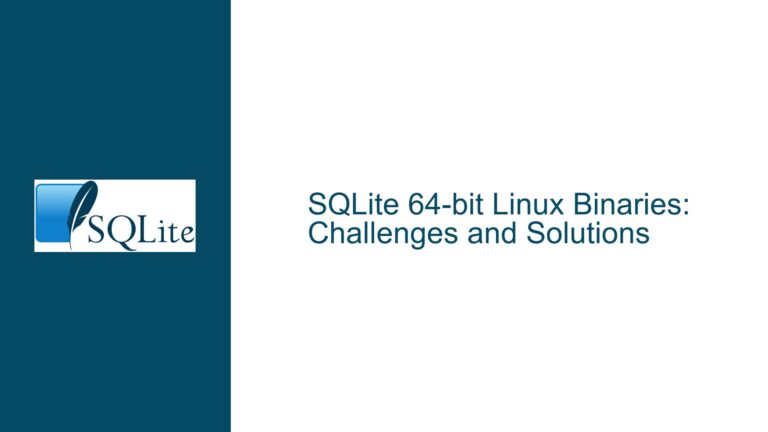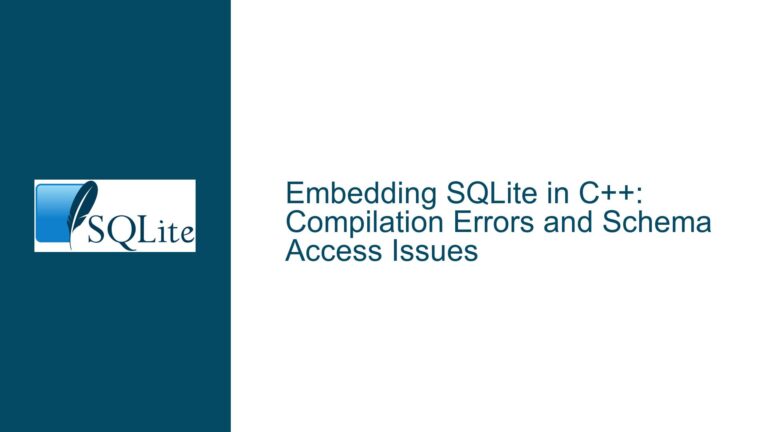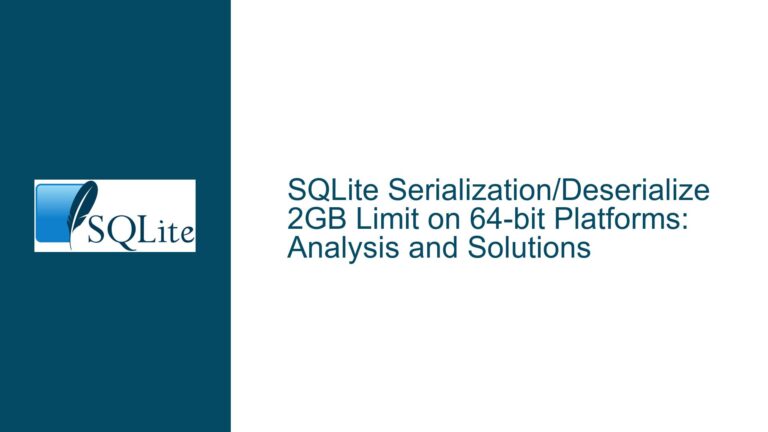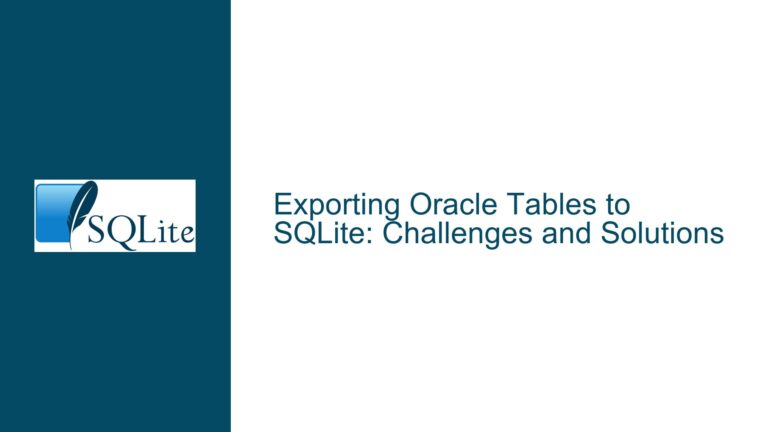Resolving sqldiff Creating Empty Files and URI Handling Issues on Windows/Linux
Issue Overview: sqldiff Creates Empty Databases and URI Filename Parsing Fails on Windows
The sqldiff utility is designed to compare and output differences between two SQLite databases. A critical issue arises when users execute sqldiff with filenames for databases that do not exist. In such cases, sqldiff creates empty database files (zero-byte files) instead of terminating with an error. This behavior occurs for both the primary (a.db) and secondary (b.db) databases under specific conditions. Additionally, when attempting to mitigate this issue using URI-style filenames with the mode=ro parameter to prevent database creation, a platform-specific discrepancy emerges: On Linux/macOS, URI parameters function as intended, but on Windows, a malformed file named file may be created instead of parsing the URI correctly. These issues stem from differences in how sqldiff opens the primary and secondary databases, combined with platform-specific compilation flags in prebuilt SQLite binaries.
The problem manifests in two distinct scenarios:
- Empty Database Creation: When
sqldiffis invoked with non-existent filenames fora.dborb.db, the tool creates empty files instead of reporting an error. This occurs because the SQLite API functions used to open or attach databases default to creating new databases when they do not exist. - URI Handling on Windows: When URI-style filenames (e.g.,
file:a.db?mode=ro) are used to enforce read-only mode and prevent database creation, Windows builds of sqldiff may misinterpret the URI syntax, leading to unintended file creation (e.g., a file namedfile). This indicates that the Windows binaries distributed by SQLite.org may not have URI filename support enabled at compile time (SQLITE_USE_URI=1), whereas Linux/macOS binaries do.
These issues affect users who rely on sqldiff for automated workflows or scripts where non-existent database files should trigger an error rather than silent file creation. The empty files can lead to false positives in comparisons or clutter directories with unintended artifacts. The URI parsing discrepancy further complicates cross-platform usage, as the same command behaves differently on Windows versus Linux/macOS.
Possible Causes: Database Opening Methods and Compilation Flags
1. Database Opening Mechanisms in sqldiff
The sqldiff tool uses two distinct methods to access databases:
- Primary Database (
a.db): Opened usingsqlite3_open_v2()with flags that control file creation. Prior to recent fixes,sqlite3_open()was used, which unconditionally creates a new database if the file does not exist. Thesqlite3_open_v2()function allows specifyingSQLITE_OPEN_READONLYto avoid creation. - Secondary Database (
b.db): Attached to the primary database connection using theATTACHSQL command. TheATTACHstatement internally usessqlite3_open(), which creates the database if it does not exist. This behavior is inherent to SQLite’sATTACHimplementation and cannot be overridden without modifying the database connection’s URI handling.
The discrepancy in file creation between a.db and b.db stems from the difference between sqlite3_open_v2() (controllable) and ATTACH (uncontrollable without URI parameters). Recent fixes address the primary database case by using SQLITE_OPEN_READONLY, but the secondary database required a workaround involving URI parameters to enforce read-only mode.
2. URI Filename Handling and Platform-Specific Compilation
SQLite supports URI-style filenames (e.g., file:b.db?mode=ro) to pass parameters such as read-only mode. For this to work, the SQLite library must be compiled with the SQLITE_USE_URI flag enabled. The sqldiff tool relies on this feature to prevent database creation for b.db by appending ?mode=ro to the filename. However, precompiled Windows binaries from SQLite.org may lack this flag, leading to incorrect parsing of URI filenames.
On Windows, when sqldiff is invoked with a URI like file:a.db?mode=ro, the lack of URI support causes SQLite to interpret file:a.db?mode=ro as a literal filename instead of a URI. This results in the creation of a file named file (the first segment before the colon) rather than opening a.db in read-only mode. In contrast, Linux/macOS binaries have SQLITE_USE_URI enabled, allowing proper parsing of URI parameters.
3. Ambiguity in User-Provided Filenames
The sqldiff tool cannot universally apply URI parameters to b.db because users may already provide URIs with custom parameters (e.g., file:b.db?cache=shared). Blindly appending ?mode=ro could conflict with existing parameters or break non-filename database identifiers like :memory:. This complexity complicates automated fixes for the b.db creation issue.
Troubleshooting Steps, Solutions & Fixes
1. Preventing Empty Database Creation
Solution A: Ensure Databases Exist Before Comparison
The simplest workaround is to verify that both databases exist before running sqldiff:
# POSIX Shell
if [ -f "a.db" ] && [ -f "b.db" ]; then
sqldiff a.db b.db
else
echo "Error: Missing database(s)"
fi
Solution B: Use URI Parameters with Read-Only Mode
To prevent sqldiff from creating a.db or b.db, use URI-style filenames with mode=ro:
sqldiff "file:a.db?mode=ro" "file:b.db?mode=ro"
This forces read-only mode, which suppresses file creation. Ensure your SQLite build supports URIs (see Platform-Specific Fixes below).
Solution C: Upgrade to SQLite 3.45.1+ with Patched sqldiff
The sqldiff tool in SQLite 3.45.1 and later includes fixes to open a.db with SQLITE_OPEN_READONLY and attach b.db using a URI with mode=ro. Verify your version:
sqldiff --version
If using an older version, download the latest precompiled binaries or build from source.
2. Resolving URI Filename Issues on Windows
Solution A: Compile sqldiff with URI Support
Build sqldiff from source with SQLITE_USE_URI=1 enabled. On Windows:
- Download the SQLite amalgamation source.
- Compile with:
cl -DSQLITE_USE_URI=1 sqldiff.c sqlite3.c -o sqldiff.exe
Solution B: Use Absolute Paths with URI Syntax
If URI support is available but path parsing is problematic, use absolute paths:
sqldiff "file:C:/path/to/a.db?mode=ro" "file:C:/path/to/b.db?mode=ro"
Solution C: Verify URI Support in Prebuilt Binaries
Test URI handling with a minimal example:
sqlite3 "file:test.db?mode=rwc" "VACUUM;"
If this creates test.db, URI support is enabled. If it creates a file named file, URI support is disabled.
3. Platform-Specific Workarounds
For Windows Users with Unmodifiable Binaries:
- Use symbolic links or batch scripts to remap filenames.
- Explicitly check for file existence before invoking sqldiff.
- Use PowerShell to validate URIs:
if (-not (Test-Path "a.db") -or -not (Test-Path "b.db")) {
Write-Error "Databases missing"
} else {
sqldiff a.db b.db
}
For Cross-Platform Scripts:
- Normalize database paths to absolute URIs.
- Detect the OS and adjust command-line arguments:
if [[ "$OSTYPE" == "msys" ]]; then
sqldiff "a.db" "b.db"
else
sqldiff "file:a.db?mode=ro" "file:b.db?mode=ro"
fi
4. Reporting and Community Fixes
If precompiled Windows binaries lack URI support, report the issue to the SQLite team. Provide details about your use case and the impact of the missing flag. Monitor SQLite’s changelog for updates to the official binaries. Engage with the community via the SQLite forum to share workarounds or collaborate on patches.
By addressing the root causes—database opening methods, URI support compilation flags, and platform-specific behaviors—users can mitigate empty file creation and URI parsing issues in sqldiff. Proactive validation of input files and leveraging SQLite’s URI parameters ensure reliable cross-platform operation.
